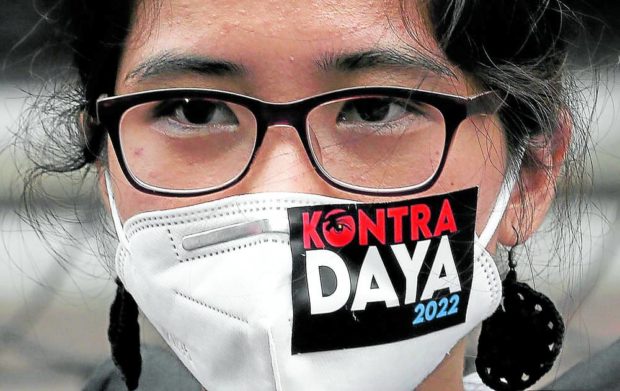
EYES ON POLL CHEATERS A member of the election watchdog Kontra Daya delivers the group’s message using her face mask, in a gathering outside the Commission on Elections office in Intramuros, Manila, on Thursday. —RICHARD A. REYES
MANILA, Philippines — In-person campaign activities for the May 9, 2022, polls will be allowed only in areas classified under COVID-19 alert level 3 and below, according to the Commission on Elections (Comelec).
Under the so-called new normal campaign rules, candidates are required to get prior approval before they can campaign, and local government units (LGUs) are authorized to issue permits for motorcades and outdoor campaign rallies, including the final “miting de avance.”
Meanwhile, accreditation for 76 party list groups have been denied with finality, mostly because of inadequate documentary proof that they represent their respective sectors.
“Majority have pleadings that were incomplete. Some were also lacking in their jurisdictional allegations,” Comelec spokesperson James Jimenez said on Thursday.
The Comelec earlier rejected 126 of the 270 party list groups that registered in October, but many of them filed an appeal.
Pandemic-era rules
Jimenez provided a summary of the pandemic-era campaign rules in a media briefing conducted in person at the Comelec headquarters in Manila and via video link.
The rules will apply during the official campaign period that begins on Feb. 8 and on March 25 for national and local candidates, respectively.
Comelec campaign committees will be formed at the national, regional, provincial and municipal levels.
Each committee will be chaired by the election director in the area. The members will include representatives of the Department of Health ( DOH), the Department of the Interior and Local Government, and the police and military.
The committees are to declare the category level in their area, mirroring the five-tiered COVID-19 alert levels determined by the DOH and the Inter-Agency Task Force for the Management of Emerging Infectious Diseases.
In-person campaigning, where candidates and their supporters personally meet voters and conduct sorties in public places, will not be allowed in areas under alert level 4 and the highest alert level 5, but allowed “without limit” in areas under the lowest alert level 1.
In areas under alert levels 2 and 3, in-person campaigning will be allowed but the entourage of candidates will be limited to five in areas under alert level 2, and to three under alert level 3.
Crowd limit
Full- or over-capacity crowds in campaign venues are prohibited.
The crowd limit is set at 70 percent of the capacity of the venue, whether indoor or outdoor, in areas under alert level 1; 50 percent of the indoor or outdoor venue capacity under alert level 2; 50 percent of the capacity of outdoor venues under alert level 3; and 30 percent of the capacity of outdoor venues under alert level 4.
The number of passengers of vehicles that will join sorties is likewise restricted, from 70-percent capacity of jeepneys, mini-trucks and trucks under alert level 1 to only 30-percent vehicle capacity under alert level 4.
Sedans, service utility vehicles and “owner-type” vehicles will be allowed to carry passengers to full capacity in campaign motorcades under alert levels 1 and 2, and only up to three passengers when under alert levels 3 and 4.
Tricycles may carry passengers to full capacity under alert levels 1 and 2, but only two passengers in areas under alert levels 3 and 4. Motorcycles will be allowed only one passenger when campaigning in areas under alert levels 1 and 2.
Seeking approval
To get approval from their respective Comelec campaign committees, candidates have to apply for a permit and submit the activity details—date, time and place, motorcade routes, venue capacity, and even the names of their companions.
For in-person campaigning, candidates have to provide not only the companions’ names but proof of their identity as well.
For indoor rallies, caucuses, meetings and conventions, candidates are required to present proof of reservation and the Department of Tourism’s accreditation of the venue.
For outdoor rallies and the “miting de avance,” as well as motorcades and caravans, candidates have to submit a permit signed by the concerned LGU and a report on planned health protocols against crowding.
Because candidates running against incumbent officials may be disadvantaged by the permit requirement, Jimenez said, local chief executives may deny a campaign permit only if a prior permit had been given for a rally to be held at the same time and location.
“If a permit to rally is applied for, the only time it can be denied is if a permit to rally has been granted for the same place and same time. [The denial] is appealable to the Comelec,” he said.
Batas Pambansa 880 Section 6(b) on rally permits will apply. It states that the mayor or his/her representative shall act on the application within two working days from the date of application; otherwise the permit shall be deemed granted.
The campaign committees are to enlist barangay officials and guards, barangay health workers, and the police and military to monitor the conduct of the campaign.
Per the Comelec, health protocol violations will be considered election offenses which, under the Omnibus Election Code, are punishable with imprisonment of one to six years, disqualification from public office and voting, and a fine for erring political parties of at least P10,000.

